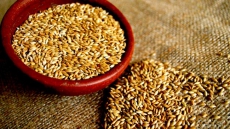TORONTO — Detecting added, or free, sugar is one of the biggest challenges consumers face when trying to read nutrition labels because it can be named many things, says registered dietitian Carol Harrison.
Sugar sleuths can also be stumped by the current nutrition facts table on food products, which lists the total sugar in one item, lumping together naturally occurring and added sugars.
"What I would suggest is that people look at the first few ingredients on the list and see if sugar is listed there. Then it's a choice you're obviously going to want to limit," says the Toronto-based Harrison.
Things that sound more "natural" — maple syrup, agave, coconut sugar, honey, syrup nectar — are not healthier.
"They're sugars and your body treats them the same kind of way. Don't be duped by the marketing and think that they're any healthier. It's still all sugar," she says.
The World Health Organization says people should limit consumption of free sugars — including sugar in honey, syrups and fruit juices — to a maximum of 10 per cent of daily calories. A further reduction to below five per cent, or roughly 25 grams (six teaspoons) per day, would provide additional health benefits.

The WHO says consumption of free sugars can contribute to becoming overweight or obese and tooth decay.
The WHO guideline does not refer to the sugars in fresh fruits and vegetables, and sugars naturally present in milk, because there's no reported evidence of adverse effects of consuming these sugars.
Here are some other names for added sugar to watch for: brown sugar, brown-rice syrup, cane sugar or evaporated cane juice, concentrated fruit juice, corn syrup, dextrose or dextrin, fructose, galactose, glucose, glucose-fructose, high fructose corn syrup, invert sugar, liquid sugar, maltose, maple syrup, molasses, nectar, raw sugar, sucrose, syrup and white sugar.
Here are some ideas from Harrison for "healthier" treat swaps or reducing sugar:
— Add sweetness naturally with diced fruit, spices like cinnamon, nutmeg and ginger, or flavourings like vanilla, almond, maple, orange or lemon extracts. Harrison bakes whole-wheat pita wedges, then dusts them with cinnamon, and serves with fruit salsa for a snack that's not too sweet.
— Instead of a chocolate pudding cup, offer one-quarter of the pudding with banana slices for dipping.
— Instead of a chocolate bar, offer a trail mix of dry whole-grain cereals, plain popcorn, pumpkin seeds, mini chocolate chips or banana chips.
— Instead of fruit roll-ups, thread fruit onto mini chopsticks and offer vanilla yogurt for dipping the kebabs.
— Substitute up to one-quarter of the granulated sugar in baking recipes with powdered milk.

— About one-third of the sugar in most recipes (except yeast breads) can be taken out without a noticeable difference.
— Instead of dousing pancakes with maple syrup, top them with applesauce and sprinkle with cinnamon. Or puree some frozen berries and mix with a little maple syrup.




